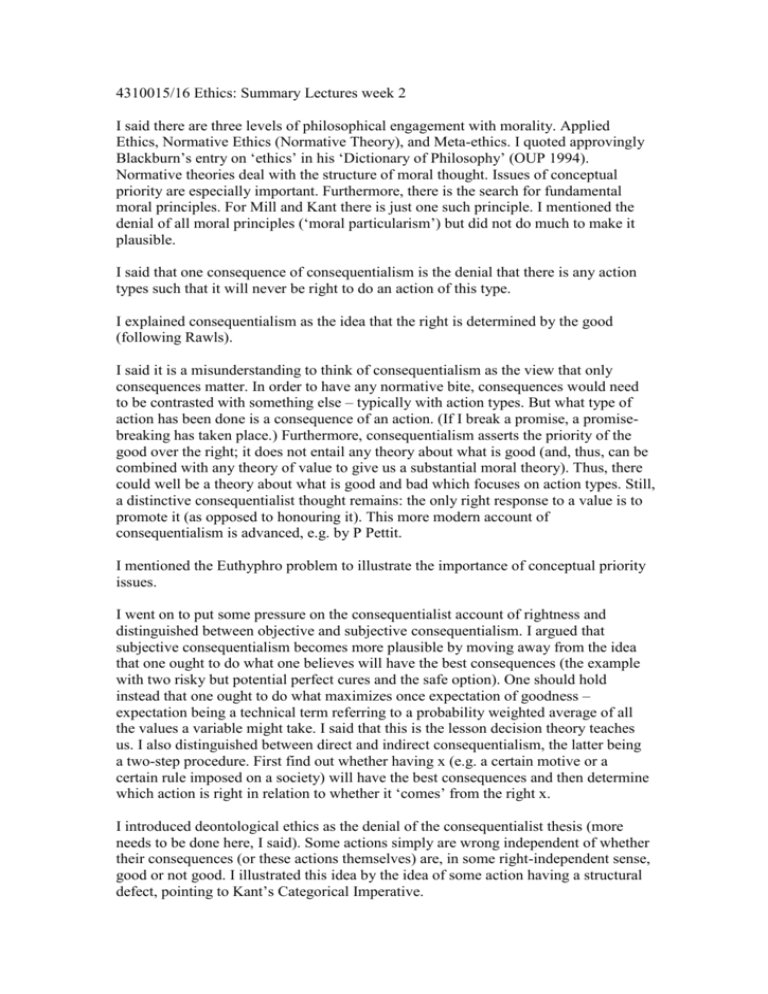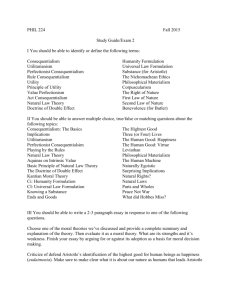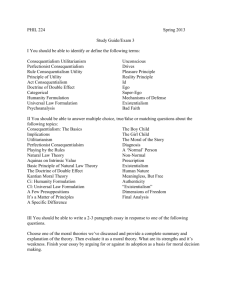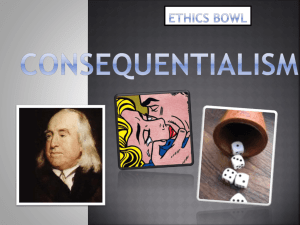4310015/16 Ethics: Summary Lectures week1
advertisement

4310015/16 Ethics: Summary Lectures week 2 I said there are three levels of philosophical engagement with morality. Applied Ethics, Normative Ethics (Normative Theory), and Meta-ethics. I quoted approvingly Blackburn’s entry on ‘ethics’ in his ‘Dictionary of Philosophy’ (OUP 1994). Normative theories deal with the structure of moral thought. Issues of conceptual priority are especially important. Furthermore, there is the search for fundamental moral principles. For Mill and Kant there is just one such principle. I mentioned the denial of all moral principles (‘moral particularism’) but did not do much to make it plausible. I said that one consequence of consequentialism is the denial that there is any action types such that it will never be right to do an action of this type. I explained consequentialism as the idea that the right is determined by the good (following Rawls). I said it is a misunderstanding to think of consequentialism as the view that only consequences matter. In order to have any normative bite, consequences would need to be contrasted with something else – typically with action types. But what type of action has been done is a consequence of an action. (If I break a promise, a promisebreaking has taken place.) Furthermore, consequentialism asserts the priority of the good over the right; it does not entail any theory about what is good (and, thus, can be combined with any theory of value to give us a substantial moral theory). Thus, there could well be a theory about what is good and bad which focuses on action types. Still, a distinctive consequentialist thought remains: the only right response to a value is to promote it (as opposed to honouring it). This more modern account of consequentialism is advanced, e.g. by P Pettit. I mentioned the Euthyphro problem to illustrate the importance of conceptual priority issues. I went on to put some pressure on the consequentialist account of rightness and distinguished between objective and subjective consequentialism. I argued that subjective consequentialism becomes more plausible by moving away from the idea that one ought to do what one believes will have the best consequences (the example with two risky but potential perfect cures and the safe option). One should hold instead that one ought to do what maximizes once expectation of goodness – expectation being a technical term referring to a probability weighted average of all the values a variable might take. I said that this is the lesson decision theory teaches us. I also distinguished between direct and indirect consequentialism, the latter being a two-step procedure. First find out whether having x (e.g. a certain motive or a certain rule imposed on a society) will have the best consequences and then determine which action is right in relation to whether it ‘comes’ from the right x. I introduced deontological ethics as the denial of the consequentialist thesis (more needs to be done here, I said). Some actions simply are wrong independent of whether their consequences (or these actions themselves) are, in some right-independent sense, good or not good. I illustrated this idea by the idea of some action having a structural defect, pointing to Kant’s Categorical Imperative. I introduced virtue ethics as another conceptual priority thesis. Ethical reflection does not start by thinking about what is good (consequentialism) or about what is definitely forbidden (deontology) but by thinking about the ideal moral agent, focussing on the character traits of such an agent, i.e. the virtues. (Look up a list of virtues somewhere.) I said that all three families of ethical theories will (obviously) provide accounts of all aspects of moral discourse. I pointed to question 6 of the old exam paper attached. 4310015/16 Ethics: Summary Lectures week 3 Meta-ethics, I said, deals with (a) logical issues relating to morality. I talked briefly about deontic logic and explained Ross’s Paradox (If obligation travel along entailment, then the following problem arises: If I ought to mail a letter, then I ought to either mail it or burn it. Thus, everything I do (even burning a letter I was supposed to mail) would fulfil an obligation I am under.) It deals with (b) ontological issues. I tried to explain what ontological statements are and introduced a distinction between things and events in terms of lacking and having temporal parts. The main ontological division is between realism and anti-realism about moral facts. There will be different forms of realism depending on the different ways we can understand moral facts (more later). Meta-ethics also deals with (c) semantic issues. I distinguished between syntax, semantics and pragmatics, saying that semantics deals with language-world relations, thus concepts like reference, truth and meaning will figure prominently in semantic theories. The main division is between cognitivists and non-cognitivists. The latter deny that morals sentences have a truth value, i.e. they deny that moral sentences can be either true or false. The former, the cognitivists think that morals sentences can be either true or false. I said that you might think it is odd to have names, which rather seem to fall within psychology, for these semantic claims. I answered that not only sentences but also beliefs can be true or false, and I explained the difference between cognitive and noncognitive attitudes with Anscombe’s story about the shopper’s list and the detective’s list, thereby introducing the idea that different directions of fit explain the difference between cognitive and non-cognitive attitudes. Meta-ethics I said also deals (d) with general issues of justification, of which I distinguished two. If someone thinks that being in pain is bad (or that stealing is wrong) we can ask, 'How do you know this?' Morality, I said, needs an epistemology in order to answer question regarding the justification of moral beliefs. I called this the problem of theoretical justification. Obviously, moral epistemologies will vary in accordance with views about what, if anything makes moral beliefs true. Not only do we need an account of justifying moral beliefs, we also want to show that moral actions are reasonable or rational. I asked you to read the Plato passages from Sterba (also provided in the form of copies) in order to have a better idea about this problem of practical justification. In one of the week 3 lectures I talked about Benatar and I said that we should distinguish the evaluative part of his argument from the part in which he aggregates these evaluations in order to compare the value of existence and non-existence. I said that his support for the idea that the absence of pleasures is good rests on a misunderstanding about the nature of rightness which, given his general consequentialism, is determined via comparative goodness. From the fact that it is right not to bring (pure) suffering into the world, it does not follow that the absence of this suffering is good; all we can infer is that such an absence is better than its presence. I also criticized both of his ways of aggregation. The fact that there is good in both cases but in the existence case there is also some bad and in the non-existence case there is no bad, does not by itself justify the claim that non-existence is better than existence. The good in the existence case might be so much greater that it outweighs the good in the non-existence case even once we have ‘subtracted’ whatever is bad when we exist. I also said that the second way of aggregation is drawing a parallel between having a wheel-chair (having the ability to heal quickly) which we might not need to the goods of being alive. Not all of these goods, I said, are instrumental goods. And then I switched to PowerPoint slides.









